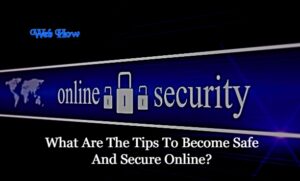
What Are The Tips To Become Safe And Secure Online?
Understanding the Importance of Online Account Security
Before diving into the tips, it’s essential to understand why securing your online accounts is vital. Your online accounts contain a treasure trove of sensitive information, including personal details, financial data, and confidential communications. If unauthorized individuals gain access to your accounts, they can exploit this information for various malicious purposes, such as identity theft, financial fraud, or even blackmail.
 |
| How To |
Moreover, compromised accounts can also be used as a gateway to launch further cyber attacks, potentially impacting your contacts, colleagues, or business associates. Therefore, investing time and effort into strengthening your online account security is a proactive measure to safeguard not only your own interests but also the broader digital ecosystem.
Essential Tech Tips for Online Account Security
1. Use Strong, Unique Passwords
One of the most basic yet crucial steps in securing your online accounts is using strong, unique passwords for each account.Don’t use passwords that are simple to figure out, such “123456” or “password.” Make complicated passwords instead, using a mix of special characters, numbers, and letters.
Furthermore, refrain from using the same password across multiple accounts. In the event that one of your accounts is compromised, using unique passwords ensures that other accounts remain secure.To create and safely store complicated passwords, think about utilizing a reliable password manager.
2. Enable Two-Factor Authentication (2FA)
Your online accounts are further secured by two-factor authentication, which requires two forms of verification before allowing access. Typically, this involves something you know (like a password) and something you have (such as a smartphone or hardware token).
Whenever feasible, turn on 2FA, especially for accounts that hold financial or sensitive information. Most major online services and platforms offer 2FA as an optional security feature. Take advantage of this additional layer of protection to mitigate the risk of unauthorized access to your accounts.
3. Keep Software and Apps Updated
Regularly updating your software, operating systems, and applications is essential for maintaining strong security posture. Software updates often include patches and fixes for known vulnerabilities, which cybercriminals exploit to gain unauthorized access to systems and accounts.
Enable automatic updates whenever possible to ensure that your devices and software are always up to date with the latest security patches. Additionally, be cautious when downloading and installing software from third-party sources, as these may contain malware or other malicious components.
4. Beware of Phishing Attempts
Phishing remains one of the most common tactics used by cybercriminals to trick individuals into divulging sensitive information or downloading malware. Phishing attacks often involve fraudulent emails, messages, or websites that impersonate legitimate entities, such as banks, social media platforms, or government agencies.
Exercise caution when interacting with unsolicited emails or messages, especially if they contain links or attachments. Avoid clicking on suspicious links or providing personal information unless you can verify the authenticity of the sender. When in doubt, contact the organization directly through official channels to confirm the legitimacy of the communication.
5. Monitor Your Accounts Regularly
Regularly monitoring your online accounts for any suspicious activity is crucial for detecting and mitigating security threats promptly. Keep an eye out for unfamiliar login attempts, unauthorized transactions, or changes to your account settings.
Many online services provide notifications or alerts for unusual account activity. Enable these notifications whenever possible to receive real-time alerts about any suspicious behavior. Additionally, review your account activity logs regularly to identify any unauthorized access or unusual patterns.
6. Secure Your Devices
Securing your devices, including computers, smartphones, and tablets, is essential for protecting your online accounts. Install reputable antivirus software and enable firewall protection to defend against malware, viruses, and other cyber threats.
Furthermore, consider encrypting your devices to prevent unauthorized access to your data in case of loss or theft. Use strong, unique passwords or biometric authentication methods to lock your devices and ensure that they are not easily accessible to unauthorized individuals.
FAQs (Frequently Asked Questions) on Online Account Security
1. Why is it important to use strong, unique passwords for online accounts?
Using strong, unique passwords is crucial because it significantly reduces the risk of unauthorized access to your accounts. Weak or common passwords are more susceptible to brute-force attacks, where cybercriminals attempt to guess passwords to gain entry.By giving each account a different password, you can make sure that even if one gets hacked, the others stay safe.
2. What is Two-Factor Authentication (2FA), and why should I enable it?
Your online accounts are further secured with Two-Factor Authentication (2FA), which requires two forms of verification before allowing access.This typically involves something you know (like a password) and something you have (such as a smartphone or hardware token). Enabling 2FA significantly enhances the security of your accounts, even if your password is compromised.
3. How do software updates contribute to online account security?
Regularly updating your software, operating systems, and applications is crucial for maintaining strong security posture. Software updates often include patches and fixes for known vulnerabilities that cybercriminals exploit. By keeping your devices and software up to date, you reduce the risk of falling victim to cyber attacks.
4. How can I recognize phishing attempts, and what should I do if I receive a suspicious email or message?
Phishing attempts can be recognized by unsolicited emails or messages that impersonate legitimate entities and often contain links or attachments. Emails requesting immediate action or personal information should be avoided. If you receive a suspicious email, avoid clicking on any links or providing sensitive information. Instead, verify the authenticity of the communication by contacting the organization directly through official channels.
5. Why is it important to monitor online accounts regularly?
Regularly monitoring your online accounts allows you to detect and respond to suspicious activity promptly. By keeping an eye out for unfamiliar login attempts, unauthorized transactions, or changes to your account settings, you can identify potential security threats early on and take appropriate action to secure your accounts.
6. How can I secure my devices to protect my online accounts?
Securing your devices, including computers, smartphones, and tablets, is essential for protecting your online accounts. Install reputable antivirus software, enable firewall protection, and keep your devices’ operating systems up to date. Additionally, use strong, unique passwords or biometric authentication methods to lock your devices and prevent unauthorized access.
7. What should I do if I suspect that one of my online accounts has been compromised?
If you suspect that one of your online accounts has been compromised, take immediate action to secure the account. Change the password to a strong, unique one, enable Two-Factor Authentication (2FA) if available, and review your account settings for any unauthorized changes. Contact the account provider’s support team for further assistance and monitor your account closely for any signs of continued unauthorized access.
8. How can a password manager help in improving online account security?
A password manager can generate, store, and autofill strong, unique passwords for each of your online accounts. This eliminates the need to remember multiple passwords while ensuring that each account has a distinct password. Password managers also encrypt your password vault, providing an additional layer of security for your credentials.
9. Are there any additional measures I can take to enhance online account security?
In addition to the tips mentioned in the blog post, consider using virtual private networks (VPNs) when accessing public Wi-Fi networks, being cautious of the information you share on social media, and regularly reviewing the privacy settings of your online accounts. Stay informed about the latest cybersecurity trends and best practices to further enhance your online account security posture.
Conclusion
Protecting your online accounts is paramount in today’s interconnected digital landscape. By implementing the essential tech tips outlined in this blog post, you can bolster the security of your accounts and mitigate the risk of unauthorized access and potential data breaches. Remember to use strong, unique passwords, enable two-factor authentication, keep your software updated, stay vigilant against phishing attempts, monitor your accounts regularly, and secure your devices to safeguard your online presence effectively. By prioritizing online account security, you can enjoy peace of mind knowing that your personal information and digital assets are well protected from cyber threats.






